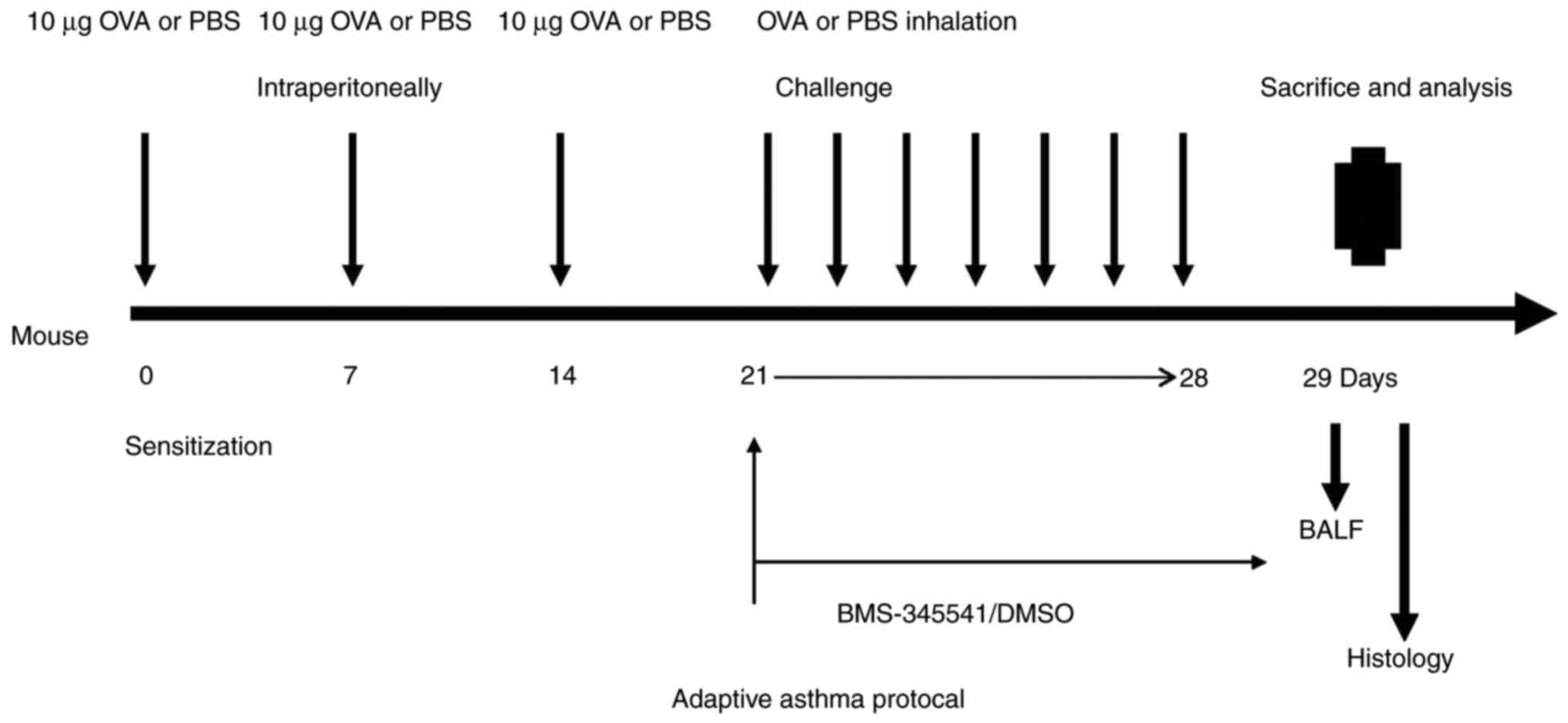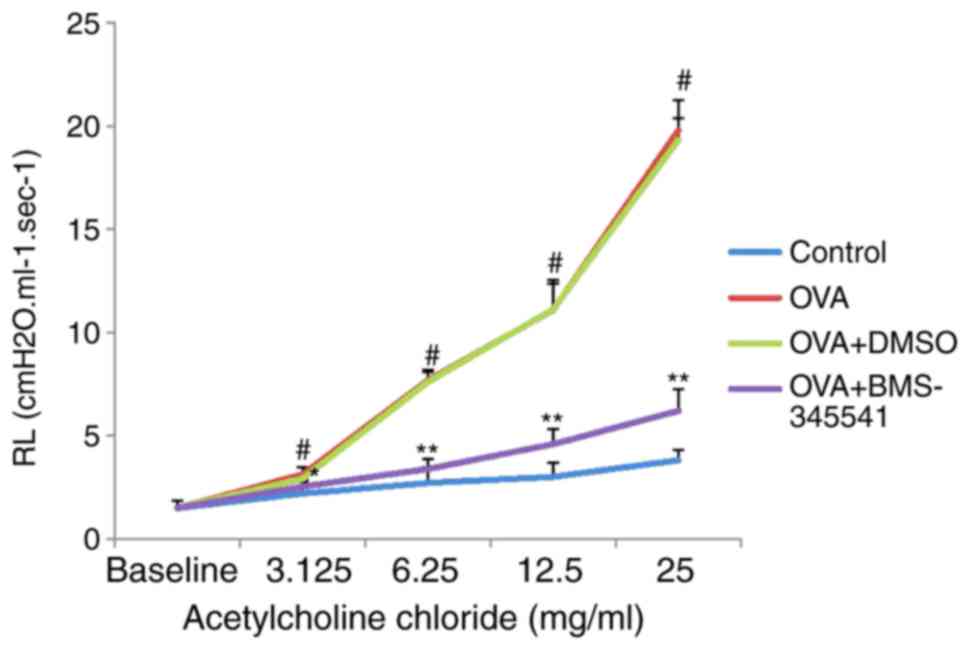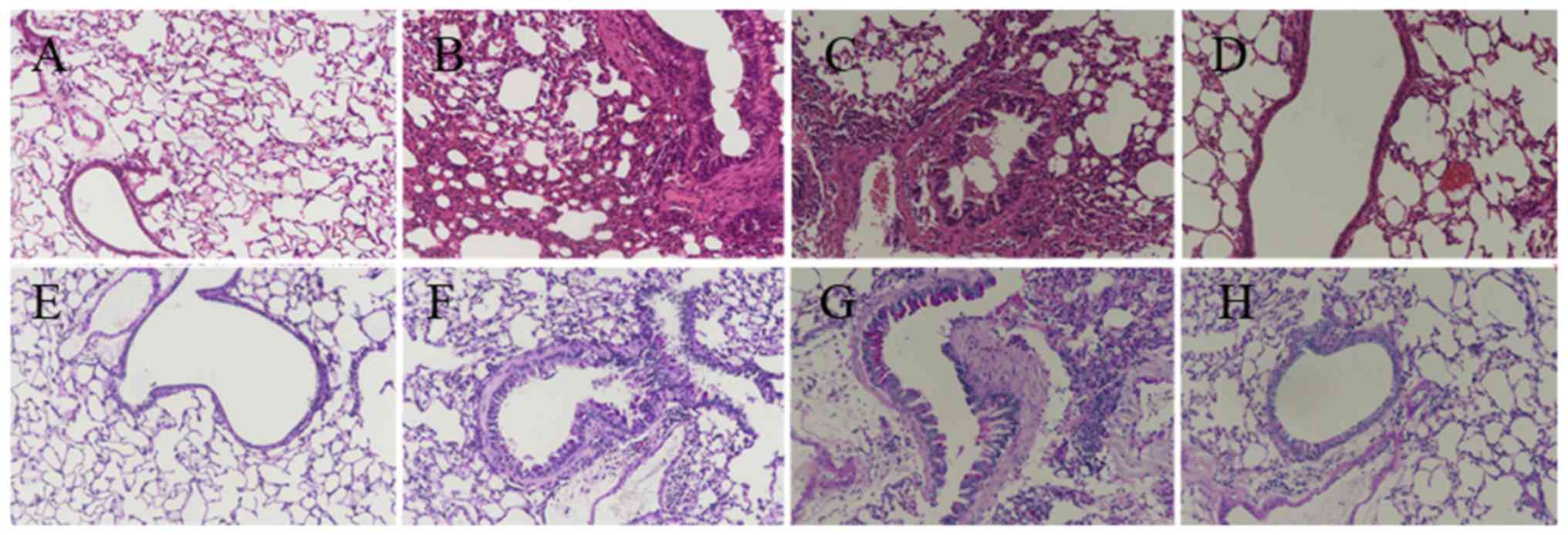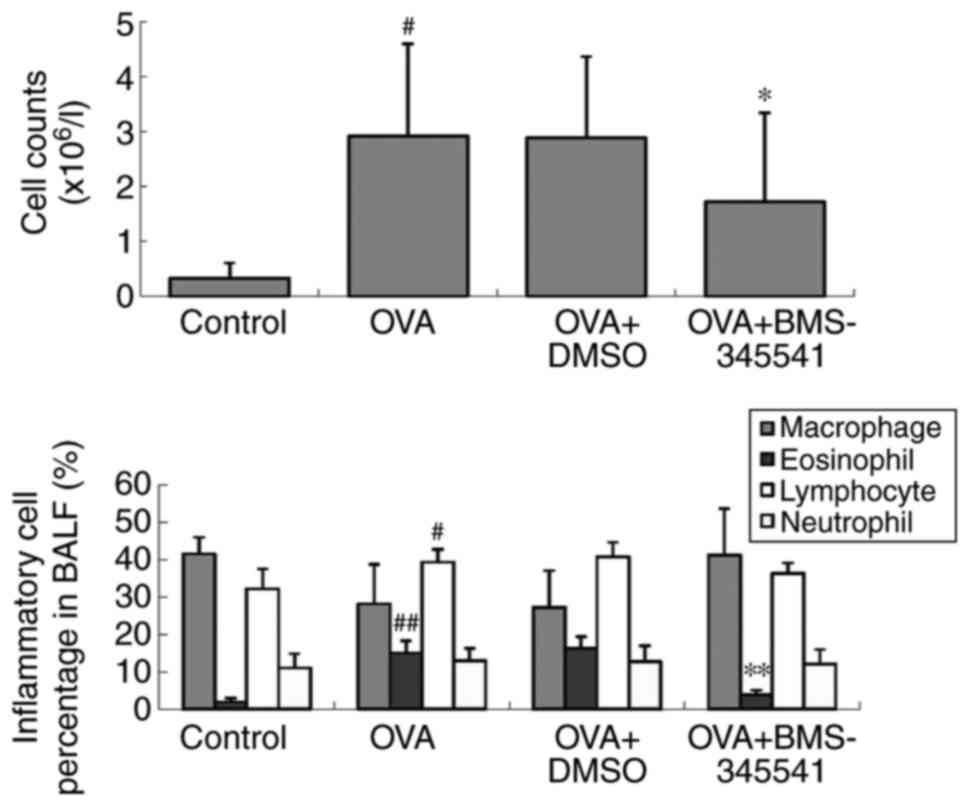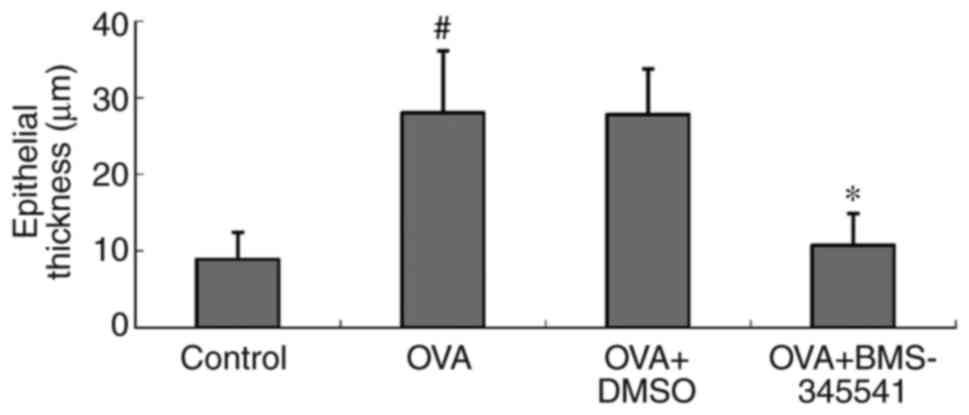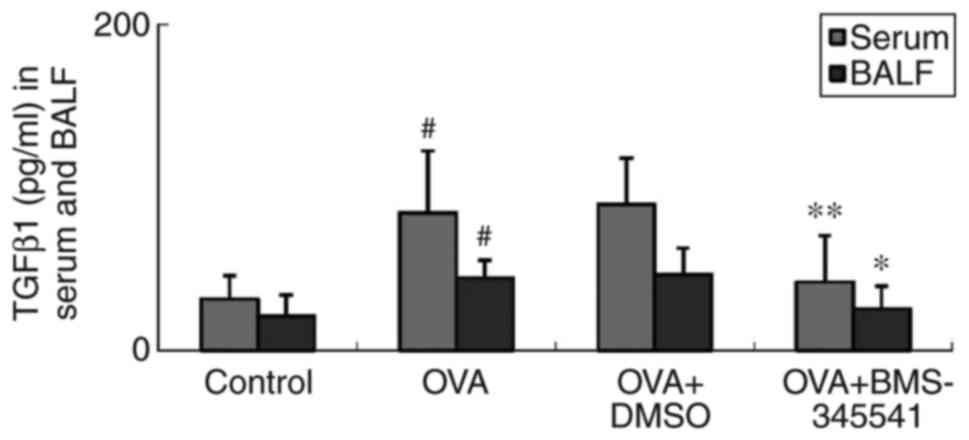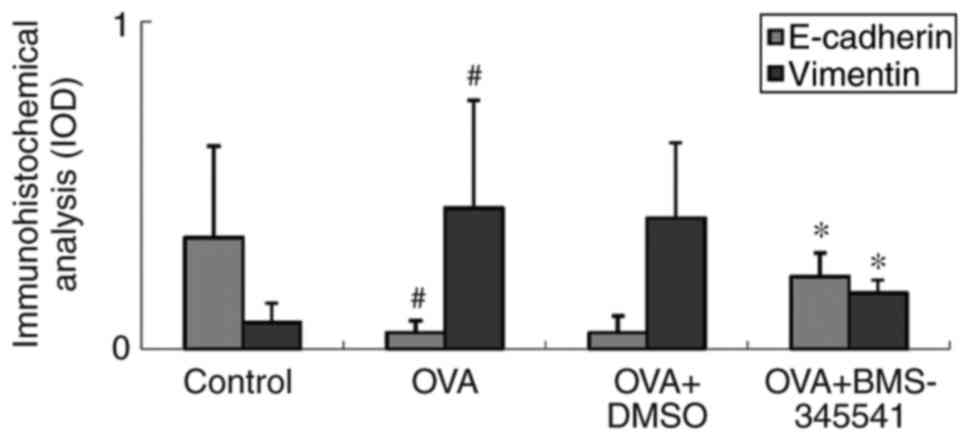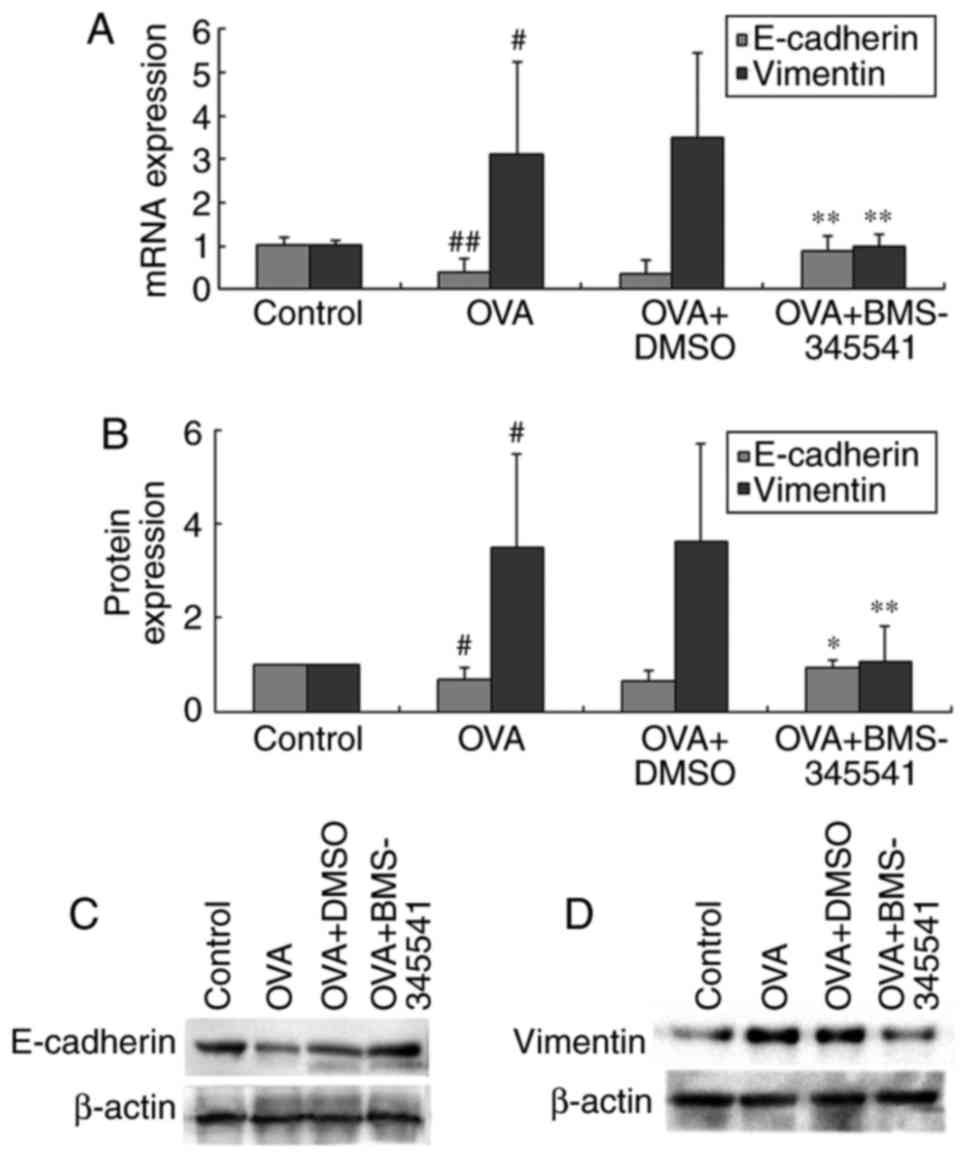|
1
|
Killeen K and Skora E: Pathophysiology,
diagnosis, and clinical assessment of asthma in the adult. Nurs
Clin North Am. 48:11–23. 2013. View Article : Google Scholar : PubMed/NCBI
|
|
2
|
Holgate ST: Pathogenesis of asthma. Clin
Exp Allergy. 38:872–897. 2008. View Article : Google Scholar : PubMed/NCBI
|
|
3
|
Bergmann KC: Bronchial asthma-many types,
different therapies. Dtsch Med Wochenschr. 141:687–692. 2016.In
German. PubMed/NCBI
|
|
4
|
Hirota N and Martin JG: Mechanisms of
airway remodeling. Chest. 144:1026–1032. 2013. View Article : Google Scholar : PubMed/NCBI
|
|
5
|
Gras D, Bourdin A, Chanez P and Vachier I:
Airway remodeling in asthma: Clinical and functional correlates.
Med Sci (Paris). 27:959–965. 2011.In French. View Article : Google Scholar
|
|
6
|
Fischer KD and Agrawal DK: Vitamin D
regulating TGF-β induced epithelial-mesenchymal transition. Respir
Res. 15:1462014. View Article : Google Scholar
|
|
7
|
Tian X, Tian X, Huo R, Chang Q, Zheng G,
Du Y, Chen Y and Niu B: Bacillus Calmette-Guerin alleviates airway
inflammation and remodeling by preventing TGF-β1 induced
epithelial-mesenchymal transition. Hum Vaccin Immunother.
13:1758–1764. 2017. View Article : Google Scholar : PubMed/NCBI
|
|
8
|
Kalita M, Tian B, Gao B, Choudhary S, Wood
TG, Carmical JR, Boldogh I, Mitra S, Minna JD and Brasier AR:
Systems approaches to modeling chronic mucosal inflammation. Biomed
Res Int. 2013:5058642013. View Article : Google Scholar : PubMed/NCBI
|
|
9
|
Ijaz T, Pazdrak K, Kalita M, Konig R,
Choudhary S, Tian B, Boldogh I and Brasier AR: Systems biology
approaches to understanding Epithelial Mesenchymal transition (EMT)
in mucosal remodeling and signaling in asthma. World Allergy Organ
J. 7:132014. View Article : Google Scholar : PubMed/NCBI
|
|
10
|
Loffredo LF, Abdala-Valencia H, Anekalla
KR, Cuervo-Pardo L, Gottardi CJ and Berdnikovs S: Beyond
epithelial-to-mesenchymal transition: Common suppression of
differentiation programs underlies epithelial barrier dysfunction
in mild, moderate, and severe asthma. Allergy. 72:1988–2004. 2017.
View Article : Google Scholar : PubMed/NCBI
|
|
11
|
Berair R and Brightling CE: Asthma therapy
and its effect on airway remodelling. Drugs. 74:1345–1369. 2014.
View Article : Google Scholar : PubMed/NCBI
|
|
12
|
Zhao Y, Tian B, Sadygov RG, Zhang Y and
Brasier AR: Integrative proteomic analysis reveals reprograming
tumor necrosis factor signaling in epithelial mesenchymal
transition. J Proteom. 148:126–138. 2016. View Article : Google Scholar
|
|
13
|
Gagliardo R, Chanez P, Profita M, Bonanno
A, Albano GD, Montalbano AM, Pompeo F, Gagliardo C, Merendino AM
and Gjomarkaj M: IκB kinase-driven nuclear factor-κB activation in
patients with asthma and chronic obstructive pulmonary disease. J
Allergy Clin Immunol. 128:635–645. e1–e2. 2011. View Article : Google Scholar
|
|
14
|
Tian F, Zhou P, Kang W, Luo L, Fan X, Yan
J and Liang H: The small-molecule inhibitor selectivity between
IKKα and IKKβ kinases in NF-κB signaling pathway. J Recept Signal
Transduct Res. 35:307–318. 2015. View Article : Google Scholar
|
|
15
|
McIntyre KW, Shuster DJ, Gillooly KM,
Dambach DM, Pattoli MA, Lu P, Zhou XD, Qiu Y, Zusi FC and Burke JR:
A highly selective inhibitor of I kappa B kinase, BMS-345541,
blocks both joint inflammation and destruction in collagen-induced
arthritis in mice. Arthritis Rheum. 48:2652–2659. 2003. View Article : Google Scholar : PubMed/NCBI
|
|
16
|
Caramori G, Adcock IM and Ito K:
Anti-inflammatory inhibitors of IkappaB kinase in asthma and COPD.
Curr Opin Investig Drugs. 5:1141–1147. 2004.PubMed/NCBI
|
|
17
|
Pattoli MA, MacMaster JF, Gregor KR and
Burke JR: Collagen and aggrecan degradation is blocked in
interleukin-1-treated cartilage explants by an inhibitor of IkappaB
kinase through suppression of metalloproteinase expression. J
Pharmacol Exp Ther. 315:382–388. 2005. View Article : Google Scholar : PubMed/NCBI
|
|
18
|
Ping H, Yang F, Wang M, Niu Y and Xing N:
IKK inhibitor suppresses epithelial-mesenchymal transition and
induces cell death in prostate cancer. Oncol Rep. 36:1658–1664.
2016. View Article : Google Scholar : PubMed/NCBI
|
|
19
|
Li H, Han W, Polosukhin V, Yull FE, Segal
BH, Xie CM and Blackwell TS: NF-κB inhibition after cecal ligation
and puncture reduces sepsis-associated lung injury without altering
bacterial host defense. Mediators Inflamm. 2013:5032132013.
View Article : Google Scholar
|
|
20
|
Wang ZW, Li RK, Ren Y, Liu XF, Cheng XL
and Tuo HY: Establishment and evaluation of a mouse model of
bronchial asthma with Yin deficiency syndrome. Zhongguo Ying Yong
Sheng Li Xue Za Zhi. 31:556–560. 2015.
|
|
21
|
Yao J, Jiang M, Zhang Y, Liu X, Du Q and
Feng G: Chrysin alleviates allergic inflammation and airway
remodeling in a murine model of chronic asthma. Int
Immunopharmacol. 32:24–31. 2016. View Article : Google Scholar : PubMed/NCBI
|
|
22
|
Yao T, Ying X, Zhao Y, Yuan A, He Q, Tong
H, Ding S, Liu J, Peng X, Gao E, et al: Vitamin D receptor
activation protects against myocardial reperfusion injury through
inhibition of apoptosis and modulation of autophagy. Antioxid Redox
Signal. 22:633–650. 2015. View Article : Google Scholar :
|
|
23
|
Livak KJ and Schmittgen TD: Analysis of
relative gene expression data using real-time quantitative PCR and
the 2(−Delta Delta C(T)) method. Methods. 25:402–408. 2001.
View Article : Google Scholar
|
|
24
|
Ordoñez CL, Khashayar R, Wong HH, Ferrando
R, Wu R, Hyde DM, Hotchkiss JA, Zhang Y, Novikov A, Dolganov G and
Fahy JV: Mild and moderate asthma is associated with airway goblet
cell hyperplasia and abnormalities in mucin gene expression. Am J
Respir Crit Care Med. 163:517–523. 2001. View Article : Google Scholar : PubMed/NCBI
|
|
25
|
Shi J, Chen M, Ouyang L, Huang L, Lin X,
Zhang W, Liang R, Lv Z, Liu S and Jiang S: Airway smooth muscle
cells from ovalbumin-sensitized mice show increased proliferative
response to TGFβ1 due to up-regulation of Smad3 and TGFβRII. J
Asthma. 54:467–475. 2017. View Article : Google Scholar
|
|
26
|
Dimitropoulou C, Drakopanagiotakis F,
Chatterjee A, Snead C and Catravas JD: Estrogen replacement therapy
prevents airway dysfunction in a murine model of allergen-induced
asthma. Lung. 187:116–127. 2009. View Article : Google Scholar
|
|
27
|
Rogers DF: Physiology of airway mucus
secretion and pathophysiology of hypersecretion. Respir Care.
52:1134–1149. 2007.PubMed/NCBI
|
|
28
|
Ojiaku CA, Yoo EJ and Panettieri RA Jr:
Transforming growth factor β1 function in airway remodeling and
hyperresponsiveness. The missing link? Am J Respir Cell Mol Biol.
56:432–442. 2017. View Article : Google Scholar :
|
|
29
|
Yang YC, Zhang N, Van Crombruggen K, Hu
GH, Hong SL and Bachert C: Transforming growth factor-beta1 in
inflammatory airway disease: A key for understanding inflammation
and remodeling. Allergy. 67:1193–1202. 2012. View Article : Google Scholar : PubMed/NCBI
|
|
30
|
Scanlon CS, Van Tubergen EA, Inglehart RC
and D'Silva NJ: Biomarkers of epithelial-mesenchymal transition in
squamous cell carcinoma. J Dent Res. 92:114–121. 2013. View Article : Google Scholar :
|
|
31
|
Kokkinos MI, Wafai R, Wong MK, Newgreen
DF, Thompson EW and Waltham M: Vimentin and epithelial-mesenchymal
transition in human breast cancer-observations in vitro and in
vivo. Cells Tissues Organs. 185:191–203. 2007. View Article : Google Scholar
|
|
32
|
Fischer KD, Hall SC and Agrawal DK:
Vitamin D supplementation reduces induction of
epithelial-mesenchymal transition in allergen sensitized and
challenged mice. Plos One. 11:e01491802016. View Article : Google Scholar : PubMed/NCBI
|
|
33
|
de Boer WI, Sharma HS, Baelemans SM,
Hoogsteden HC, Lambrecht BN and Braunstahl GJ: Altered expression
of epithelial junctional proteins in atopic asthma: Possible role
in inflammation. Can J Physiol Pharmacol. 86:105–112. 2008.
View Article : Google Scholar : PubMed/NCBI
|
|
34
|
Schuliga M: NF-kappaB signaling in chronic
inflammatory airway disease. Biomolecules. 5:1266–1283. 2015.
View Article : Google Scholar : PubMed/NCBI
|
|
35
|
Gu X, Zhang Q, Du Q, Shen H and Zhu Z:
Pinocembrin attenuates allergic airway inflammation via inhibition
of NF-κB pathway in mice. Int Immunopharmacol. 53:90–95. 2017.
View Article : Google Scholar : PubMed/NCBI
|
|
36
|
Burke JR, Pattoli MA, Gregor KR, Brassil
PJ, MacMaster JF, McIntyre KW, Yang X, Iotzova VS, Clarke W, Strnad
J, et al: BMS-345541 is a highly selective inhibitor of I kappa B
kinase that binds at an allosteric site of the enzyme and blocks
NF-kappa B-dependent transcription in mice. J Biol Chem.
278:1450–1456. 2003. View Article : Google Scholar
|
|
37
|
MacMaster JF, Dambach DM, Lee DB, Berry
KK, Qiu Y, Zusi FC and Burke JR: An inhibitor of IkappaB kinase,
BMS-345541, blocks endothelial cell adhesion molecule expression
and reduces the severity of dextran sulfate sodium-induced colitis
in mice. Inflamm Res. 52:508–511. 2003. View Article : Google Scholar
|
|
38
|
Carneiro PJ, Clevelario AL, Padilha GA,
Silva JD, Kitoko JZ, Olsen PC, Capelozzi VL, Rocco PR and Cruz FF:
Bosutinib therapy ameliorates lung inflammation and fibrosis in
experimental silicosis. Front Physiol. 8:1592017. View Article : Google Scholar : PubMed/NCBI
|















